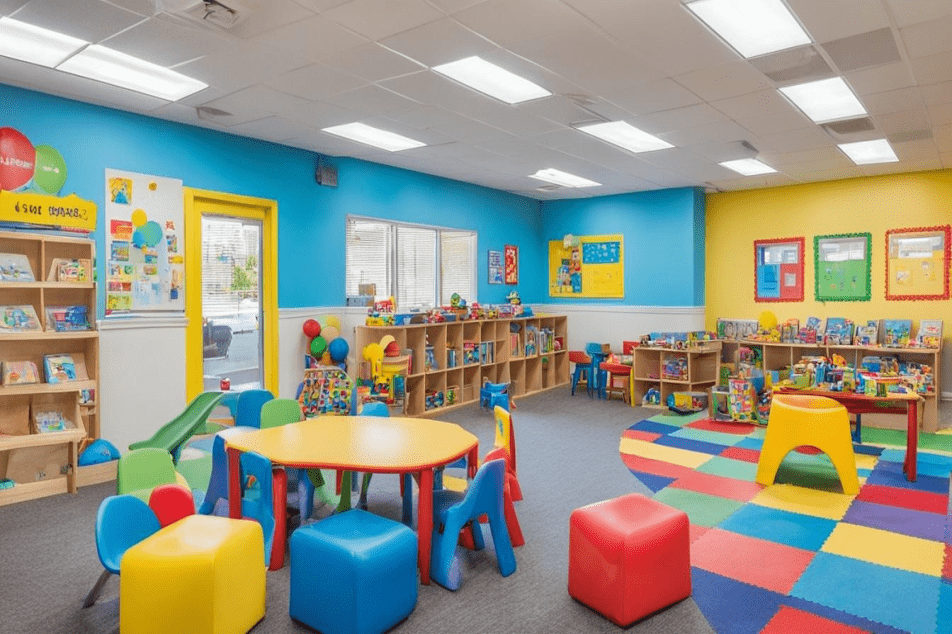
Play does more than entertain kids; it lays the foundation for creativity and learning. When children play, they enter a world where their imagination grows and their talents emerge. Play is crucial in shaping children's minds, allowing them to think creatively and handle emotions. Through pretend play and exploration, children gain emotional intelligence and cognitive strength. This process is key in play therapy for children.
Understanding the Foundation: The Role of Play in Child Development: Fostering Creativity and Learning
Play in early childhood is more than fun; it is key to development. It helps shape a child's brain, teaching and touching their heart. This makes play crucial for learning.
The Importance of Creative Process in Early Years
The first years of life are vital for brain growth through play. Activities like drawing, building, or sharing stories boost emotional and mental health. They lay the groundwork for resilience and creativity.
Play enhances empathy, problem-solving, and communication. These skills are fundamental for a child's growth and happiness.
Recognizing Play as a Child's Language and a Window to Their Development
Play is how many kids express themselves. It shows us how they see things and understand their world. Creativity in child development is crucial. Both structured and free play are important. They help kids learn to socialize and navigate group settings.
Children grow in leaps through play. They mimic, invent, and push their thinking skills further. This shows how vital play is for learning and creativity. By exploring through play, children become well-rounded, capable of critical thought. It's a powerful educational tool for developing young minds.
Varieties of Play Experiences and the Development of Creativity

Playing in school makes learning better. It helps kids learn important skills. It also lets them explore and celebrate different cultures. This feeds their imagination and creativity. Including games with multicultural themes teaches kids to see and value the world's diversity.
Integrating Multi-Cultural and Multi-Ethnic Experiences
When kids play games from different cultures, they learn about the world. Cooking foods from various countries or dancing to traditional music are great ways for this. These activities add to their learning and help them get along with others.
Celebrating Diversity Through Artistic Expression
Art speaks a language everyone understands, and it helps kids be creative. By doing art from different cultures, like painting or dancing, kids can show who they are. They also learn about other people. These activities make them value different cultures more.
Using diverse play in learning does more than just teach kids. It builds their creativity on a deep level. It draws from the rich tapestry of human experiences. It helps them grow both in their minds and their social skills.
The Dynamics of Play-Based Learning and Cognitive Growth

Play is crucial in kids' learning. It's more than fun. It helps kids think and learn in new ways. By playing, kids develop their imagination and problem-solving skills.
The Relationship Between Play Activities and Problem-Solving Skills
Play-based learning is key for children to develop problem-solving abilities. As kids play, they learn to make decisions and solve problems. This learning style builds their cognitive skills for the future.
How Unstructured Play Promotes Self-Directed Learning
Unstructured play is also vital. It lets kids make their own decisions and figure out how to reach their goals. This kind of play improves their ability to learn on their own. It encourages kids to try new things, making learning an adventure.
Enhancing Social-Emotional Skills Through Play Interactions

Play is key in growing social and emotional skills in kids. It gives kids vital experiences that help develop important skills. Through play, kids learn about their emotions and how to understand others. This paves the way for them to build emotional intelligence and better social skills.
The benefits of play are many, especially in developing skills needed for success and well-being in life.
Role-Playing as a Portal to Understanding Emotions and Perspectives
Role-playing lets kids step into different situations that imitate real life. It's a great way to learn empathy and awareness of emotions. Kids take on various roles and learn how to respond to different situations. This helps them build social skills and empathy.
Building Empathy and Cooperation in Group Play Settings
Group play helps kids learn how to work together and solve conflicts. They understand the value of teamwork, sharing, and listening to others. Playing with others boosts their social skills. It helps their emotional and social growth in a caring way.
Play is not just fun. It's also crucial for a child's early development. The skills learned from play are very valuable. They help with better social interactions and managing emotions as kids grow. So, including both free play and structured play in education is very important for a child's overall growth.
Nurturing Physical Development in Children with Play Activities

Dynamic play helps kids grow physically. When they play outside, they not only use energy and get healthy. They also develop important gross motor skills. These skills are key for their fitness and wellness in life.
Play is crucial for improving motor skills and coordination. It helps kids interact better with their surroundings. Outdoor activities offer challenges that make children stronger. They boost muscle strength and coordination.
Outdoor activities that foster physical development in children:
- Running
- Skipping
- Climbing
Outdoor play helps kids both physically and mentally. It leads to better focus in school. Kids learn to keep trying and become resilient. This teaches them to tackle challenges head-on.
| Activity | Motor Skill Developed | Coordination Enhanced |
|---|---|---|
| Running | Leg muscle development | Whole body balance |
| Skipping | Rhythm and timing | Hand-feet coordination |
| Climbing | Arm and leg strength | Eye-hand-foot coordination |
Adding these activities to daily play gives kids big benefits. They grow more physically strong in fun ways. This kind of play builds important skills. It also sets a foundation for a healthy and active life ahead.
Play and the Expansion of Language and Communication Abilities

Play and language growth are deeply connected in early childhood. Kids learn to express themselves and grasp the world during play. Activities like role-playing and storytelling greatly boost their way of communicating.
Advancements in Vocabulary and Syntax Through Role-Playing Games
Role-playing games are a key part of learning language. Children act out real-life events, trying out new words and phrases. They build language skills and gain confidence in speaking through play.
The Impact of Storytelling on Language Comprehension and Use
Storytelling is crucial for learning. It draws in kids, creating a space for language growth. It helps kids understand more, remember stories, grow their vocabulary, and sharpen their storytelling ability.
Play teaches children how to communicate and understand others. It's key for education and social success. Focusing on storytelling and role-playing builds a base for better talking and thinking skills.
The Critical Role of Creativity in the Learning Process

Creativity is very important in growing up. It helps bring out new ideas and ways to solve problems in kids. Creative play lets children share their thoughts freely. This is key to growing their creative skills. Such learning keeps kids interested and helps their brains grow.
Play that makes kids think hard helps them face and fix problems in new ways. Learning this way isn't just fun. It's a powerful way to get ready for school and life ahead. It lets kids try out their ideas and expand their creativity.
How to encourage creativity in the learning process:
- Encouraging experimentation and exploration to boost problem-solving skills.
- Developing executive function: an understanding of cause and effect through interactive play.
- Enhancing the ability to think laterally and approach problems from multiple angles.
Linking creativity with play is key for learning complex ideas as kids get older. Adding creative and critical thinking into early learning is vital. It helps prepare a child to become a smart, creative adult.
Strategies for Encouraging Creative Play in Educational Settings

In today's schools, it's key to boost creativity through play. Teachers and parents strive to make learning spaces that inspire kids to dream and invent. Must-have essential supplies is a key element for daycare centers. Such environments aid in kids' growth and creative skills.
Leveraging Open-Ended Questions to Boost Imaginative Thinking
Asking open-ended questions during play sparks imagination. These questions set the stage for kids to think deeply and share ideas. "What if" and "Imagine if" start conversations that lead kids on an exploration journey.
Designing Environments That Foster Spontaneous and Inventive Play
The design of learning spaces is crucial for fostering creativity. Spaces filled with different materials invite kids to play inventively. For instance, a corner with art supplies and blocks encourages storytelling and building.
Such setups also promote important skills like thinking and social interacting. They show that the right environment can unlock endless creative moments for kids.
What role does playtime play in fostering children's creativity and learning abilities?








